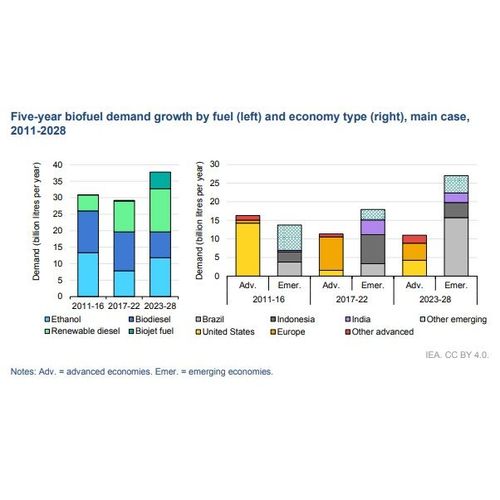IEA predicts increased biofuel demand through 2028

SOURCE: International Energy Agency
January 15, 2024
BY Erin Voegele
The International Energy Agency released a new report on Jan. 11, Renewables 2023, predicting that global biofuel demand will expand by 38 billion liters (10.4 billion gallons) between 2023 and 2028.
In the report, the IEA predicts that total biofuel demand will increase 23 percent to 200 billion liters by 2028. Renewable diesel and ethanol are expected to account for two-thirds of that growth, with biodiesel and biobased sustainable aviation fuel (SAF) accounting for the remainder.
Most of the new biofuel demand over the next five years is expected to come from emerging economies, particularly Brazil, Indonesia and India. Ethanol and biodiesel use is expected to expand the most in these regions. Renewable diesel and biobased SAF are expected to be the primary growth segments in advanced economies, including the U.S., European Union, Canada and Japan.
Advertisement
According to the IEA, renewable diesel and biobased SAF consumption are expected to expand by 18 billion liters through 2028. The U.S. and Europe are expected to account for 80 percent of that increase.
Ethanol and biodiesel are expected to expand by 13 percent over the next five years, with growth in emerging economies offsetting declines in advanced ones. The report predicts that European ethanol demand is expected to rise slightly through 2028, but that that increase will be offset by declines in the U.S. where gasoline use is expected to shrink. Biodiesel consumption is expected to expand in Brazil and Indonesia. The U.S. and Europe are expected to remain major biodiesel markets during the next five years, accounting for more than one-third of global biodiesel demand in 2028. Renewable diesel, however, is expected to capture new growth in demand due to its superior blending properties.
Advertisement
The IEA predicts that more than 60 percent of global biofuel demand and production growth over the next five years will take place in Brazil, Indonesia, India and Malaysia. Across these countries, ethanol use is expected to increase by 13 billion liters through 2028, with biodiesel consumption increasing by 8 billion liters. That projected growth accounts for nearly all expected expansion in emerging economies over the next five years.
Globally, biobased SAF use is expected to expand by nearly 5 billion liters through 2028, making up nearly 1 percent of global jet fuel supplies. The U.S., Europe and Japan are at the forefront of that expected growth.
In addition to these baseline predictions, the IEA’s report also outlines forecasts associated with the agency’s “accelerated case” in which stronger policy drivers and other factors could lead to significantly higher biofuel consumption.
A full copy of Renewables 2023 is available on the IEA website.
Related Stories
Varo Energy, a European energy company based in Switzerland, on March 31 announced an agreement to acquire Preem, a Sweden-based petroleum and biofuels company that is developing additional renewable diesel and SAF capacity.
The U.S. Department of Commerce has disbanded an advisory committee that provided the agency with private sector advice aimed at boosting the competitiveness of U.S. renewable energy and energy efficiency exports, including ethanol and wood pellets.
Iowa’s Renewable Fuels Infrastructure Program on March 25 awarded nearly $3 million in grants to support the addition of E15 at 111 retail sites. The program also awarded grants to support two biodiesel infrastructure projects.
Tidewater Renewables Ltd. has reported there was a minor fire on April 1 in the main renewable diesel process unit at the corporation's renewable diesel refinery located in Prince George, British Columbia.
U.S. operatable biofuels capacity increased slightly in January, with gains for ethanol, according to the U.S. EIA’s Monthly Biofuels Capacity and Feedstock Update, released March 31. Feedstock consumption was down when compared to December.
Upcoming Events










